About us
IDN Global News
World Threatened with More Nuclear Arms as Modernization of Arsenals Continues
By Thalif Deen
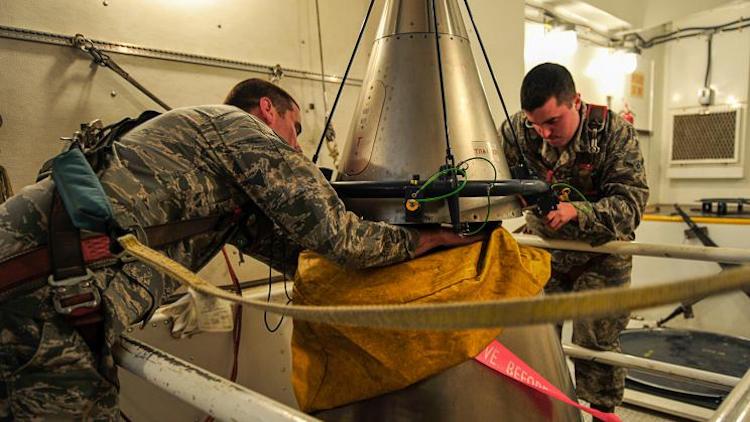
UNITED NATIONS (IDN) — The growing modernization of the world’s nuclear arsenal is threatening an increase of deadly weapons in the not-too-distant future.
The grim prediction comes from the latest Yearbook released June 13 by the Stockholm International Peace Research Institute (SIPRI) 2022.
One of the key findings is that despite a marginal decrease in the number of nuclear warheads in 2021, nuclear arsenals are expected to grow over the coming decade. [2022-06-13-06] JAPANESE TEXT VERSION PDF
World Threatened with More Nuclear Arms as Modernization of Arsenals ContinuesRead More »
A Side Event at TPNW Conference Focusses on Nuclear Weapons Victims
By Aurora Weiss
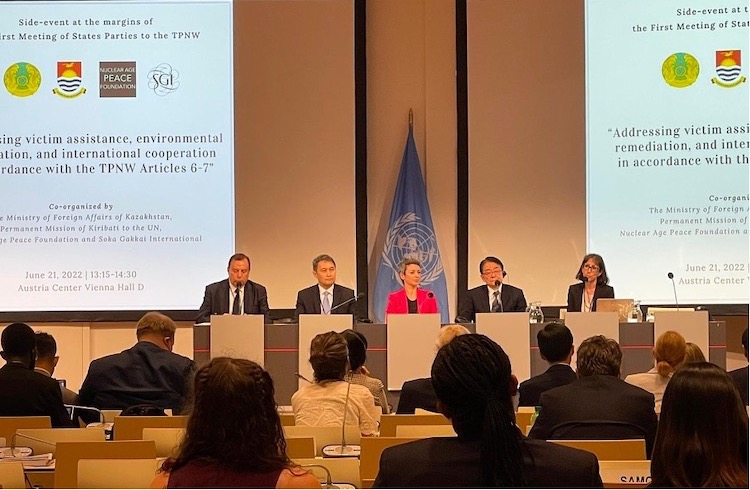 VIENNA (IDN) — “Today is a historic moment,” are the words with which the First Meeting of States Parties to the Treaty on the Prohibition of Nuclear Weapons (TPNW) opened in Vienna on June 21. Representatives of the international community, government, civil society and academia gathered here to put into effect the historic Treaty and to shape the future of nuclear disarmament.
VIENNA (IDN) — “Today is a historic moment,” are the words with which the First Meeting of States Parties to the Treaty on the Prohibition of Nuclear Weapons (TPNW) opened in Vienna on June 21. Representatives of the international community, government, civil society and academia gathered here to put into effect the historic Treaty and to shape the future of nuclear disarmament.
Regardless of national interests or belief systems, there is meanwhile agreement that what was considered illusory a decade ago, has become a stark reality. The big powers are in possession of some of the most catastrophic nuclear weapons ever created. [2022-06-21-08] JAPANESE TEXT VERSION PDF
A Side Event at TPNW Conference Focusses on Nuclear Weapons VictimsRead More »
Faith Communities Greet First Nuclear Weapons Ban Conference
By IDN-INPS Team
 VIENNA (IDN) — Faith communities “from a diversity of traditions and located all over the world” have joined together “with one voice to mark” the first meeting of the States Parties to the Treaty on the Prohibition of Nuclear Weapons (MSP) to the Treaty on the Prohibition of Nuclear Weapons (TPNW).”
VIENNA (IDN) — Faith communities “from a diversity of traditions and located all over the world” have joined together “with one voice to mark” the first meeting of the States Parties to the Treaty on the Prohibition of Nuclear Weapons (MSP) to the Treaty on the Prohibition of Nuclear Weapons (TPNW).”
In a ‘Joint Interfaith Statement’ issued on June 21 they “welcome this historic occasion and celebrate this milestone that moves us closer to a world without nuclear weapons”. The Statement urges the States Parties of the TPNW to heed the voices of the world’s hibakusha.[2022-06-22]
Faith Communities Greet First Nuclear Weapons Ban ConferenceRead More »
ICRC Accentuates the Vital Importance of Nuclear Disarmament
Following are excerpts from the text of ICRC President Peter Maurer’s statement at the TPNW MSP1 on February 21, 2022.
 VIENNA (IDN) — A decade ago, this may have seemed illusory. Today, a global, unequivocal, comprehensive prohibition of nuclear weapons—the most catastrophic weapons ever created—is a reality. We owe this reality to the tireless efforts of many:[2022-06-23]
VIENNA (IDN) — A decade ago, this may have seemed illusory. Today, a global, unequivocal, comprehensive prohibition of nuclear weapons—the most catastrophic weapons ever created—is a reality. We owe this reality to the tireless efforts of many:[2022-06-23]
ICRC Accentuates the Vital Importance of Nuclear DisarmamentRead More »
SGI Amplifies Voices of Youth, Faith Communities and Nuclear Victims
By IDN-INPS Team
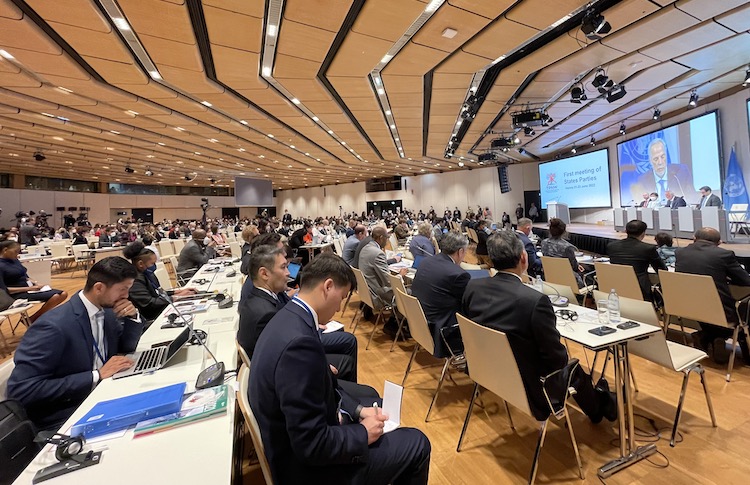 VIENNA | TOKYO (IDN) — From June 21–23, at the historic First Meeting of States Parties (1MSP) to the UN Treaty on the Prohibition of Nuclear Weapons (TPNW), held in Vienna, Austria, the Soka Gakkai International (SGI) joined civil society groups calling for universalization of the Treaty, cohosting workshops highlighting perspectives of affected communities and youth.
VIENNA | TOKYO (IDN) — From June 21–23, at the historic First Meeting of States Parties (1MSP) to the UN Treaty on the Prohibition of Nuclear Weapons (TPNW), held in Vienna, Austria, the Soka Gakkai International (SGI) joined civil society groups calling for universalization of the Treaty, cohosting workshops highlighting perspectives of affected communities and youth.
Hirotsugu Terasaki, SGI Director General of Peace and Global Issues, commented, “At this time of existential threat, all who gathered here have categorically asserted that nuclear weapons are morally and legally unacceptable. We welcome the Vienna Declaration and Action Plan and are determined to continue our efforts to strengthen the effectiveness of this groundbreaking Treaty.”[2022-06-24]
SGI Amplifies Voices of Youth, Faith Communities and Nuclear VictimsRead More »
Let’s Eliminate Nuclear Weapons, Before They Eliminate Us
By Thalif Deen
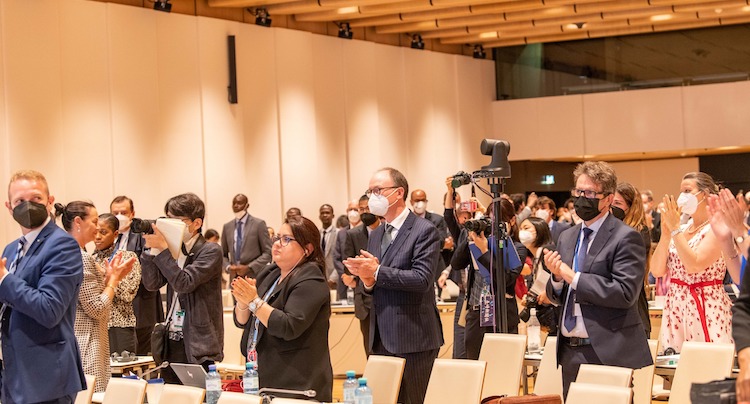 UNITED NATIONS (IDN) — When UN Secretary-General António Guterres congratulated States Parties to the Treaty on the Prohibition of Nuclear Weapons (TPNW) on the successful conclusion of their first meeting in Vienna, his warning was dead on target.
UNITED NATIONS (IDN) — When UN Secretary-General António Guterres congratulated States Parties to the Treaty on the Prohibition of Nuclear Weapons (TPNW) on the successful conclusion of their first meeting in Vienna, his warning was dead on target.
“Let’s eliminate these weapons before they eliminate us,” he said pointing out that nuclear weapons are a deadly reminder of countries’ inability to solve problems through dialogue and collaboration. [2022-07-06-09] JAPANESE TEXT VERSION PDF
Let’s Eliminate Nuclear Weapons, Before They Eliminate UsRead More »
Here you will find the articles from 2013 to 2021 – from 2022
>>>> Go to our NEW website <<<<
The US Conceding Alone Would Lead to Successful Negotiations
Viewpoint by Jonathan Power
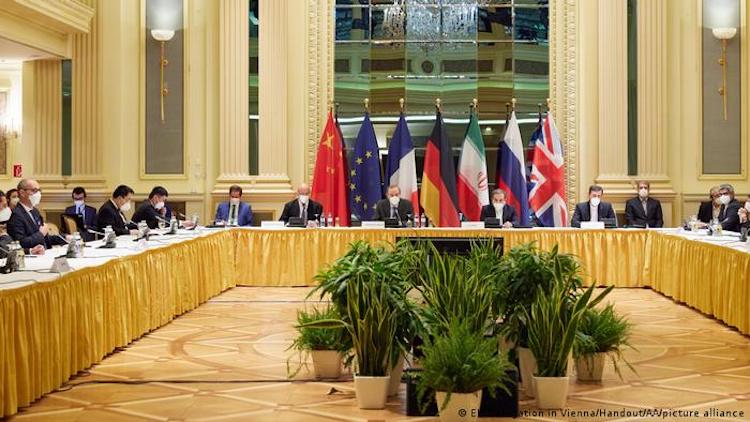 Photo: The talks are aimed at bringing Iran back into full compliance with the 2015 deal and paving the way for the US to rejoin. Source: Germany’s international broadcaster Deutsche Welle.
Photo: The talks are aimed at bringing Iran back into full compliance with the 2015 deal and paving the way for the US to rejoin. Source: Germany’s international broadcaster Deutsche Welle.
LUND, Sweden (IDN) — The negotiations over Iran’s supposed nuclear bomb-building abilities seem to be stuck in a rut. On December 27, they re-started once again. Given the detailed undertakings by Iran made in the agreement negotiated by the administration of President Barack Obama before President Donald Trump sabotaged it, it should have only been a hop, skip and a jump to forge a final agreement once President Joe Biden decided to resurrect it. [2021-12-28]
The US Conceding Alone Would Lead to Successful NegotiationsRead More »
Stockholm Initiative Determined to Achieve the Elimination of Nuclear Weapons
By Ramesh Jaura
 Photo: Gathering of Stockholm Initiative for Nuclear Disarmament against the backdrop of the city of Stockholm (August 2020) showing the Kastellet, Vasa Museum, and Nordic Museum.
Photo: Gathering of Stockholm Initiative for Nuclear Disarmament against the backdrop of the city of Stockholm (August 2020) showing the Kastellet, Vasa Museum, and Nordic Museum.
BERLIN | STOCKHOLM (IDN) — The 16-nation Stockholm Initiative for Nuclear Disarmament has urged the upcoming Tenth Review Conference of the Nuclear Non-Proliferation Treaty (NPT) from January 4-28, 2022, “to demonstrate political leadership, honour commitments and achievements made under the Treaty, and set ourselves on a decisive path towards a world free of nuclear weapons, in the interest of preserving humanity”. [2021-12-25-22] ITALIAN | JAPANESE TEXT VERSION PDF | NORWEGIAN
Stockholm Initiative Determined to Achieve the Elimination of Nuclear WeaponsRead More »
An Important TPNW Signal from Germany—But Nothing More
Viewpoint by Herbert Wulf
This article was issued by Toda Peace Institute and is being republished with their permission.
 Photo: Annalena Baerbock, German Foreign Minister. Photocosmos1/Shutterstock
Photo: Annalena Baerbock, German Foreign Minister. Photocosmos1/Shutterstock
BONN (IDN) — The new German coalition government will not rock the foundations of German foreign and security policy. It wants to remain a reliable partner in the EU and NATO. But it sends an important signal for disarmament and arms control efforts. The 177-page coalition agreement contains the following passage on the TPNW: [2021-12-22]
An Important TPNW Signal from Germany—But Nothing MoreRead More »
More Articles...
- 1. The Challenge of Nuclear Submarine Proliferation
- 2. Mayors for Peace Say the Danger of Nuclear War Is Real and Growing
- 3. Middle East Nuclear-Weapons-Free Zone, Long Elusive, is Making Progress, say Experts
- 4. Die Eliminierung von Interkontinentalraketen würde die Chancen eines globalen nuklearen Holocaust erheblich verringern
- 5. Elimination of ICBMs Would Greatly Reduce the Chances of a Global Nuclear Holocaust
Search
Newsletter
Report & Newsletter
Toward a World Without Nuclear Weapons 2022






